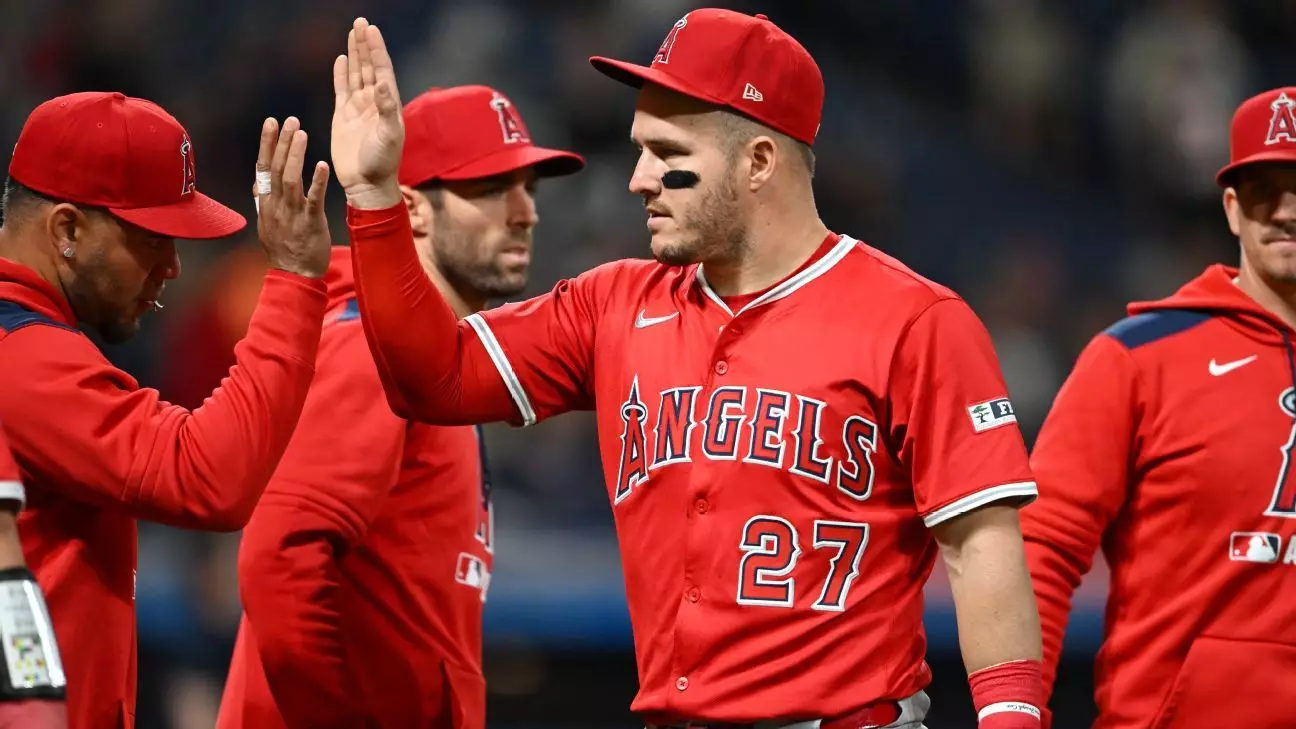In the world of Major League Baseball, few names resonate as profoundly as Mike Trout’s. The Los Angeles Angels have faced a tumultuous season, and Trout’s much-anticipated return has sent ripples of hope throughout the organization and its fanbase. Initially projected to rejoin the lineup in Boston, Trout was rather swiftly activated, marking his comeback earlier than expected. This move was significant not merely for the stats on paper but also the psychological boost it provided to a beleaguered team. After a lengthy 26-game absence due to a bone bruise—a painful reminder of previous knee operations—Trout stepped into the batter’s box once again in a recent game against the Cleveland Guardians. His 1-for-5 performance, while not spectacular, conducted a symphony of hope, reinvigorating an Angels roster that had managed to stumble through a five-game losing streak.
The Burdens of Injuries
For Trout, the challenges of physical injuries haven’t been a fleeting concern; they’ve become a familiar adversary over the years. Since 2021, he has remarkably spent more than half of the games sidelined due to various injuries, including calf issues, a back injury, and a recent meniscus problem that relegated him to a frustrating stint on the Injured List. This pattern of injuries could easily diminish a player’s resolve, yet Trout’s mental fortitude shines as a point of admiration within baseball circles. The burden of injuries has forced him not just to confront physical challenges, but emotional ones too—every game missed is a moment lost in a game he loves passionately.
Managerial Perspectives
Manager Ron Washington’s comments provide fascinating insights into the dynamics that Trout must navigate on his return. By batting Trout fifth for the first time in over a decade, Washington demonstrated a cautious yet strategic approach to managing the team’s expectations. The choice reflects an understanding that Trout may need time to regain his stature atop the lineup, emphasizing patience in a sport that often favors immediate results. Washington’s decision contrasts with traditional expectations that star players should automatically return to their highest slots—this foresight indicates a valuable understanding of human limits, especially in elite-level competition.
The Evolving Role of the Designated Hitter
Although Trout has traditionally occupied positions in the field, his current stint as a designated hitter has ignited discussions about evolving roles in baseball. With a .273 batting average and six homers from that position, it appears Trout may excel even when not manning the outfield. His accessibility as a designated hitter allows the Angels to maximize his ability to impact the game while minimizing the strain on his injured knee. This versatility challenges the existing norms of player positions and showcases Trout’s resilience and adaptability—a refreshing narrative in the rigid landscapes of sports roles.
Team Dynamics and Culture
Trout’s presence resonates beyond individual performance; it reverberates through the very culture of the Angels franchise. With rising stars like Logan O’Hoppe commenting on the significance of Trout’s return, it’s evident that the organization thrives on his experience and leadership. The notion of “latching on to newness” in a competitive landscape speaks to the psychological aspects of sports—a reminder that victories come not only from the scoreboard but also a team’s collective morale. In this moment, Trout symbolizes stability, tradition, and aspiration—a beacon for his teammates as they navigate the complex waters of a long season.
Future Uncertainties
As Trout remains determined yet cautious about his future, the question looms: how much should he risk for the sake of the game? The unpredictable nature of bone bruises, combined with his past, demands a cautious approach. Existing in an industry that often glorifies the relentless pursuit of excellence can create pressure on players like Trout. The vow to continue evaluating his physical condition reflects a mature understanding of the nuance between ambition and health. This awareness not only impacts his trajectory but raises discussions on athlete welfare, an ever-relevant topic in contemporary sports.
Mike Trout’s return is not merely a statistic to fill the box score; it signifies resilience against adversity and the complexities of personal and team growth. As he re-integrates into the Angels lineup, his journey reflects themes of hope, strategy, and the relentless pursuit of greatness that defines the spirit of baseball.

